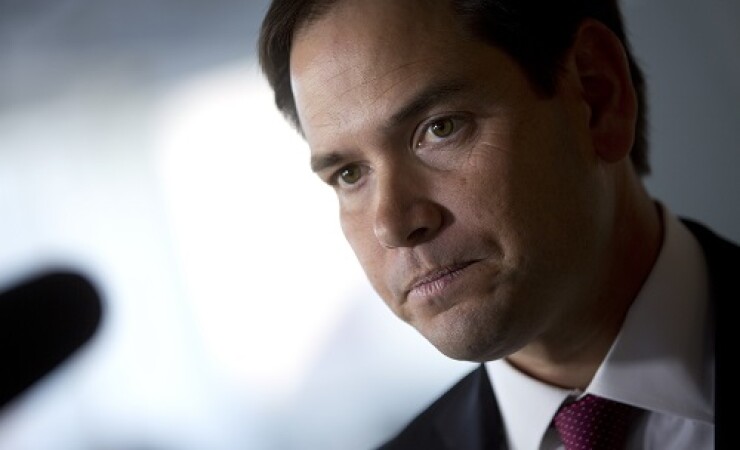In the years after the financial crisis, banks were under orders from regulators to amass huge piles of capital to help guard against another downturn. Now, as regulatory requirements have eased, many banks are moving quickly to unload that excess capital, largely by repurchasing their own stock.
Since Jan. 1, publicly traded banking companies have initiated 95 share-repurchase plans, according to data compiled by Capital Performance Group in Washington, D.C. If the pace continues, banks will approve a total of 247 buyback plans this year, nearly double last year’s amount.
The share buyback frenzy has accelerated as federal regulators have

It’s also happening at a time when lawmakers have started to debate whether stock buybacks stymie long-term economic growth and should be restricted. A proposal, issued in February by Sen. Marco Rubio, R-Fla., has not yet been included in legislation, but Rubio has said that restrictions on buybacks would force companies to step up capital investments and create jobs.
“Cash spent on share repurchases is not cash spent on capital investment,” Rubio told Bloomberg.
To be sure, banks would prefer to deploy excess capital into earning assets, such as loans or investment securities. But they have to tread carefully at a time when
Companies initiate repurchase plans for the purpose of boosting returns to investors. Stock buybacks reduce the number of a company’s outstanding shares, making each remaining share more valuable.
The $129 billion-asset Regions Financial in Birmingham, Ala., for example, is in the midst of a $2 billion share repurchase program that it first announced last summer.
“If loans aren’t growing, we will buy back stock,” David Turner, Regions' chief financial officer said on May 15 at an investor conference.
Still, even banks located in high-growth areas and presumably have plenty of loan demand have approved new repurchase plans.
The $3.5 billion-asset Mercantile Bank in Grand Rapids, Mich., approved
The Nashville, Tenn., metro area had the third-fastest-growing gross regional product in that period. The $5.3 billion-asset FirstBank, based in Nashville, projects yearly organic loan growth of between 10% and 12%, said Chief Financial Officer James Gordon. But FirstBank continues to repurchase shares because its tangible common equity ratio at March 31 was 10.5% and the bank prefers it to be closer to 9%.
“Our organic growth is not consuming enough of our excess capital,” Gordon said.
FirstBank prefers to deploy capital through M&A and organic growth, when possible, Gordon said. But repurchases fill the void when those opportunities are not available.
The buyback plan “provides [FirstBank] an additional avenue to opportunistically return capital to our shareholders,” CEO Christopher Holmes said in October when the plan was announced. “Our capital priorities continue to be organic growth and ensuring flexibility to fund acquisitions.”
Bankers and investment analysts say that buybacks are particularly attractive now because bank stocks, while up year to date, are generally trading well below their 52-week highs. As of the close of trading Monday, the Keefe, Bruyette & Woods Nasdaq Bank Index was up 13% this year, but is down 14% from its 52-week high.

As long as bank stocks don’t become too expensive, banks are going to keep repurchasing shares, said Frederick Cannon, an analyst at Keefe, Bruyette & Woods.
Still, he said, “The market is not going to get as excited about earnings growth when it comes from share repurchases as they would from topline earnings growth.”
There is some concern among investment advisers that banks are becoming too aggressive in repurchasing shares and increasing dividends to shareholders and will ultimately be left with too little of a capital cushion to withstand the next downturn.
In a report released in November, the debt rating agency Fitch Ratings said that it “remains cautious of banks materially increasing distributions [such as share repurchases], particularly at this point in the credit cycle.”
Others say that buybacks discourage long-term investments.
Rubio’s proposal is to
But Marty Mosby, an analyst at Vining Sparks, said it would be a mistake to discourage companies and banks to not repurchase shares. Companies will make capital investments when they have the opportunity, because the investments have the potential to create higher returns. Share repurchases are used only when those opportunities are limited or unavailable.
Share repurchases push capital into free markets, which “allows investors to reinvest in other companies that need the capital,” Mosby said. “It’s a very efficient way to reallocate capital across the economy.”





